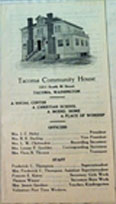 Among the student papers in our Archives & Special Collections is the Sociology I paper of Georgina Rowland, a freshman at the College of Puget Sound in 1932. The document is intriguing because the writer simultaneously expressed prejudice towards non-white people and amenity towards the racially inclusive work done at Tacoma Community House. Georgina wrote on the importance of maintaining the Community House, a local Christian charity, in order to help “the foreigner in an adopted country.” She noted that the most productive work the charity could do was with children, instilling in them a patriotic spirit and “respect for ‘their country.’” In describing how different nationalities of immigrants kept their homes, Georgina inadvertently revealed the racism of her time: “The Negro home represents the future problem in the Community House work,” she noted, going on to remark that miscegenation was an even larger problem in the neighborhood. In the face of a perceived “race problem,” Rowland advocated the Community House as a safe space for immigrants to share their common experiences and improve their lives through English lessons, employment, medical care, library access, and membership in Boy and Girl Scouts Troops. Overall, she determined that “the privileges and good of a Settlement do not come to one race. Exclusion is not known at the Community House.”
Among the student papers in our Archives & Special Collections is the Sociology I paper of Georgina Rowland, a freshman at the College of Puget Sound in 1932. The document is intriguing because the writer simultaneously expressed prejudice towards non-white people and amenity towards the racially inclusive work done at Tacoma Community House. Georgina wrote on the importance of maintaining the Community House, a local Christian charity, in order to help “the foreigner in an adopted country.” She noted that the most productive work the charity could do was with children, instilling in them a patriotic spirit and “respect for ‘their country.’” In describing how different nationalities of immigrants kept their homes, Georgina inadvertently revealed the racism of her time: “The Negro home represents the future problem in the Community House work,” she noted, going on to remark that miscegenation was an even larger problem in the neighborhood. In the face of a perceived “race problem,” Rowland advocated the Community House as a safe space for immigrants to share their common experiences and improve their lives through English lessons, employment, medical care, library access, and membership in Boy and Girl Scouts Troops. Overall, she determined that “the privileges and good of a Settlement do not come to one race. Exclusion is not known at the Community House.”
Despite Georgina’s outdated language, this paper expresses the progressive role that Tacoma Community House had and maintains today providing “services to refugees, immigrants, and English speaking adults and youth.” Georgina’s “The Tacoma Community House: A Social Settlement” also exemplifies how much sociology has changed as a field from the 1930s to today, and would be an interesting read for a current student in the Sociology and Anthropology department.
For more social, historical documents, visit the Archives & Special Collections, which holds slave receipts from the 1830s, a Confederate letter from the Civil War, and civil marriage agreements written in Spanish from the 1770s.
By Maya Steinborn
